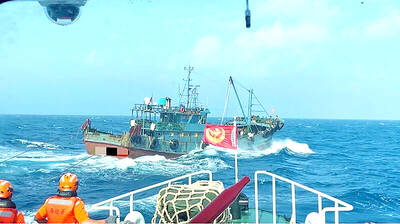While Democratic Progressive Party Chairperson and presidential candidate Tsai Ing-wen’s (蔡英文) cross-strait policy has recently been put in the spotlight, the Chinese Nationalist Party (KMT) considers itself to have the upper hand in the issue, underscoring its continued adherence to the so-called “1992 consensus.”
While the DPP has settled on its presidential candidate, the KMT is mired in a nebulous situation where not a single party heavyweight has announced an intention to run for president.
However, a source from the pan-blue camp said that as the KMT’s cross-strait standpoint and policies are relatively clear, it would have an advantage over the DPP in being able to “stabilize the cross-strait relationship” without further explanations and clarifications.
The KMT is thus better than the DPP at promoting cross-strait trust and interaction, the source said.
The majority of Taiwanese support positive interactions and peaceful development, but oppose unpredictability between the two sides across the Taiwan Strait, according to the source, who added that many “economic voters” who travel between the two nations would be expected to think rationally.
“Economic voters” is a phrase used to refer to Taiwanese citizens who hold large financial stakes in China.
Chinese President Xi Jinping (習近平) earlier this month described the “1992 consensus” as “recognizing that the mainland and Taiwan belong to one China,” to which the KMT did not respond directly.
However, KMT Chairman Eric Chu (朱立倫) said in Hong Kong on March 9 that the KMT’s position on cross-strait relations is “sticking to the ‘1992 consensus.’”
The KMT is a fervent believer in the “consensus,” the source said, adding that it remains the foundation of cross-strait mutual trust.
Following Chu’s identification with the “1992 consensus” as the party’s guideline on cross-strait issues, a KMT party member said that the party can be sure that the future KMT presidential candidate — whoever that might be — would fall in line on this position, and the public would be able to distinguish the two parties by their respective cross-strait policies.
The “1992 consensus” refers to a tacit understanding between the KMT and the Chinese Communist Party that both Taiwan and China acknowledge there is “one China,” with each side having its own interpretation of what that means.
In 2006, then-KMT lawmaker Su Chi (蘇起) said that he created the term in 2000 when he was Mainland Affairs Council chairman.

POLITICAL AGENDA: Beijing’s cross-strait Mid-Autumn Festival events are part of a ‘cultural united front’ aimed at promoting unification with Taiwan, academics said Local authorities in China have been inviting Taiwanese to participate in cross-strait Mid-Autumn Festival celebrations centered around ideals of “family and nation,” a move Taiwanese academics said politicizes the holiday to promote the idea of “one family” across the Taiwan Strait. Sources said that China’s Fujian Provincial Government is organizing about 20 cross-strait-themed events in cities including Quanzhou, Nanping, Sanming and Zhangzhou. In Zhangzhou, a festival scheduled for Wednesday is to showcase Minnan-language songs and budaixi (布袋戲) glove puppetry to highlight cultural similarities between Taiwan and the region. Elsewhere, Jiangsu Province is hosting more than 10 similar celebrations in Taizhou, Changzhou, Suzhou,

The Republic of China (ROC) is celebrating its 114th Double Ten National Day today, featuring military parades and a variety of performances and speeches in front of the Presidential Office in Taipei. The Taiwan Taiko Association opened the celebrations with a 100-drummer performance, including young percussionists. As per tradition, an air force Mirage 2000 fighter jet flew over the Presidential Office as a part of the performance. The Honor Guards of the ROC and its marching band also heralded in a military parade. Students from Taichung's Shin Min High School then followed with a colorful performance using floral imagery to represent Taiwan's alternate name

COGNITIVE WARFARE: Chinese fishing boats transmitting fake identification signals are meant to test Taiwan’s responses to different kinds of perceived incursions, a report said Chinese vessels are transmitting fake signals in Taiwan’s waters as a form of cognitive warfare, testing Taipei’s responses to various types of incursions, a report by the Institute for the Study of War said on Friday. Several Chinese fishing vessels transmitted fake automatic identification system (AIS) signals in Taiwan’s waters last month, with one mimicking a Russian warship and another impersonating a Chinese law enforcement vessel, the report said. Citing data from Starboard Maritime Intelligence, the report said that throughout August and last month, the Chinese fishing boat Minshiyu 06718 (閩獅漁06718) sailed through the Taiwan Strait while intermittently transmitting its own AIS

CHINESE INFILTRATION: Medical logistics is a lifeline during wartime and the reported CCP links of a major logistics company present a national security threat, an expert said The government would bolster its security check system to prevent China from infiltrating the nation’s medical cold chain, a national security official said yesterday. The official, who wished to stay anonymous, made the remarks after the Chinese-language magazine Mirror Media (鏡周刊) reported that Pharma Logistics (嘉里醫藥物流) is in charge of the medical logistics of about half of the nation’s major hospitals, including National Taiwan University Hospital and Taipei Veterans General Hospital. The company’s parent, Kerry TJ Logistics Co (嘉里大榮物流), is associated with the National Committee of the Chinese People’s Political Consultative Conference (CPPCC) and the Chinese People’s Liberation Army (PLA), the